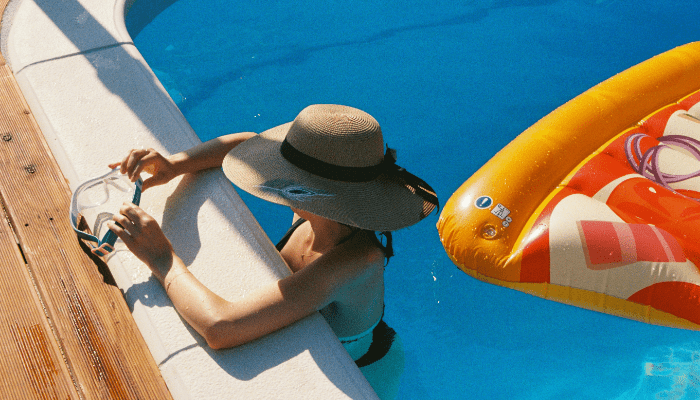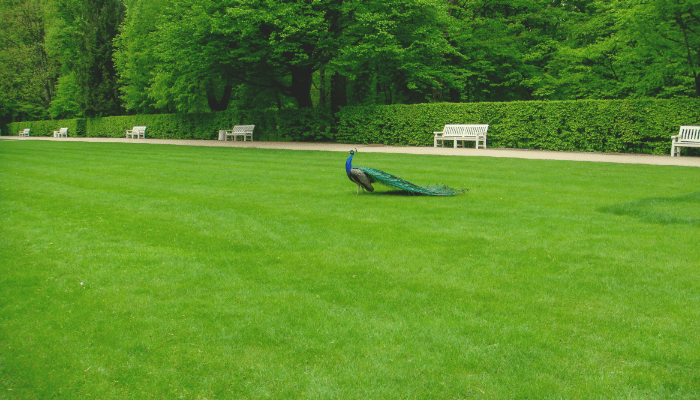Key Takeaways
Natural pools are booming in Portugal: eco‑friendly, chemical‑free, and perfect for the climate.
They filter with plants and microbes, not chlorine, creating clear, living water.
Pick experienced builders who know local soils, plants, and permits.
Ask: Have they built natural pools here? What plants/materials? Who handles permits and aftercare? Can you visit a past project?
Top builders: Biopiscinas, Dreampools, Oásis Biosistema, Swim Natural, Quinta Kania.
Costs & timing: €30k-€145k for most builds, around 2-3 months construction.
Pros: sustainable, beautiful, low upkeep.
Cons: higher upfront cost, needs time to mature.
Portugal now ranks among Europe’s top 5 countries for sustainable pool installations.
That’s not a fad. That’s a full-blown shift in how we think about outdoor living.
Natural swimming pools, those chemical-free, plant-filtered, eco-luxurious beauties aren’t just for wellness retreats or off-grid villas anymore. They’re making their way into suburban gardens, coastal quintas, and even upscale city homes. And for good reason.
You get the luxury of a private pool without the chlorine burns, without the ugly blue tiles, and without turning your backyard into a sterile water box.
But, and this is a big but, not all builders are created equal.
Hiring someone who’s never worked with a regeneration zone or doesn’t understand Portugal’s specific soil types? Risky. That’s how you end up with a glorified pond and a mosquito colony.
In this guide, I’ll walk you through exactly how to find and vet the right natural swimming pool builders in Portugal, ones who actually know what they’re doing. Whether you’re in the Algarve or up in Porto, you’ll get actionable steps, insider questions, and a shortlist of companies who deliver the goods.

What Is a Natural Swimming Pool?
A natural swimming pool is not just a regular pool with some reeds stuck around it. It’s a beautifully engineered ecosystem.
Instead of relying on chlorine or salt, natural pools clean water through a regeneration zone, usually made of gravel, aquatic plants, and microbes that do all the hard work behind the scenes.
The pool is divided into two areas: one for swimming and one for cleaning. They’re connected, often side-by-side, flowing like a river with a mission. No chemicals, no harsh filtration. Just nature doing its thing.
And yes, the water’s crystal clear when done right. You’re not swimming in a bog, you’re gliding through a living, self-cleaning system. It’s like taking a dip in a mountain spring… except it’s in your backyard.
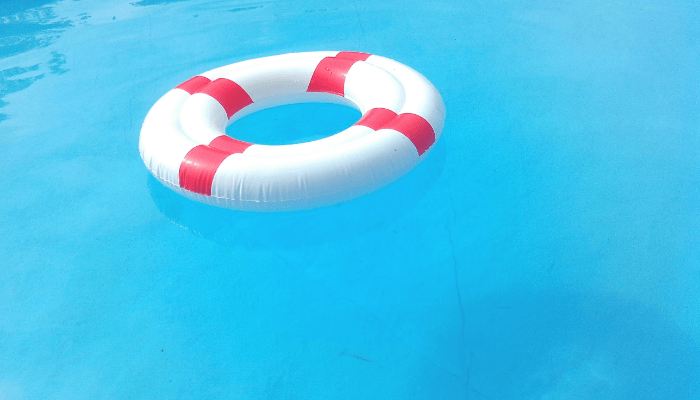
Why Choose a Natural Pool in Portugal?
Let’s be honest, Portugal is tailor-made for natural pools.
The country’s climate supports diverse aquatic plant life. Long summers mean more time to enjoy it. And with increasing awareness around sustainability and energy costs, chemical-free options are gaining serious traction here.
Plus, natural pools just fit the Portuguese landscape. A traditional blue-tiled rectangle looks completely out of place next to a stone farmhouse in Alentejo or a forested hillside in Sintra.
A bio pool? That melts into the scenery like it was always meant to be there.
Bonus: they often qualify as more eco-friendly in permit processes, especially in rural areas where environmental guidelines are tighter.
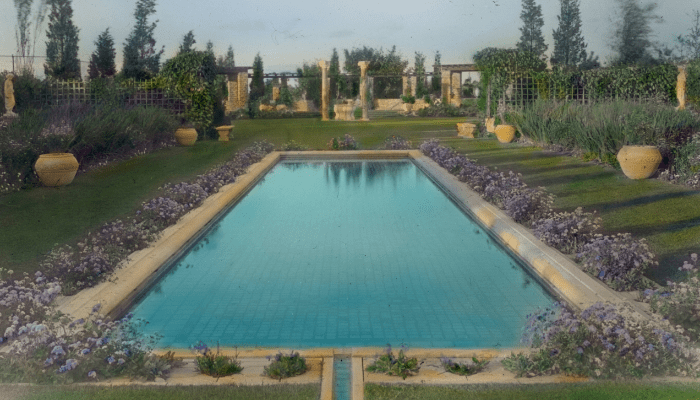
What to Look for in a Natural Swimming Pool Builder
This isn’t the job for your cousin with a shovel and a Pinterest board.
You want a specialist. Someone who actually understands the biology, the plumbing, the plants, the Portuguese soil, and what happens when it rains sideways in Madeira.
Here’s what matters:
- Proven experience with natural filtration systems, not just traditional pools
- Knowledge of native plants (don’t trust anyone suggesting palm trees in Trás-os-Montes)
- Local regulation know-how, yes, permits are a thing here
- Willingness to show past work and let you talk to past clients
And if someone tells you they can “figure it out as they go”? Walk away. Quickly.
Top Questions to Ask Before Hiring
Let’s skip the awkward sales pitch and get to the good stuff. These are the questions you should absolutely be asking:
- Have you built natural swimming pools in Portugal before?
- What specific materials and plants do you use for the regeneration zone?
- How long will construction take, and who handles the permits?
- What’s your typical maintenance plan for clients after handover?
- Can I see one of your existing projects in person?
The last one? Huge. Seeing the real thing beats any website slideshow. Plus, it gives you a chance to talk to the owner, see how the system holds up, and maybe even take a swim.
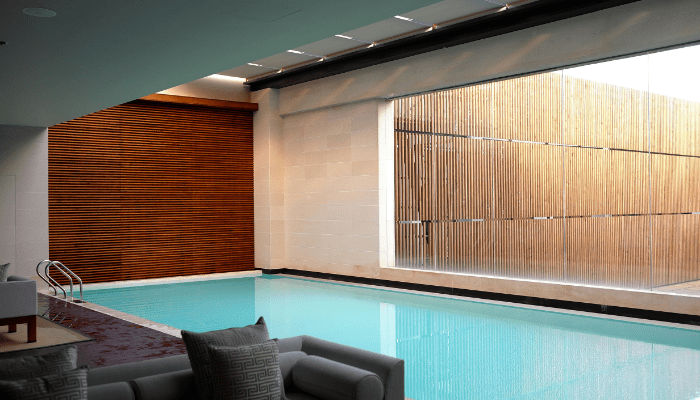
5 Recommended Natural Swimming Pool Builders in Portugal
1. Biopiscinas (Aljezur, Algarve)
Established in 2001, Biopiscinas is a pioneer in designing and constructing biological swimming pools in Portugal. They introduced the term “Piscinas Biológicas®” to the Portuguese market and have completed over 270 projects nationwide. Their approach integrates landscape architecture with ecological principles, creating pools that harmonize with the natural environment.
Notably, Biopiscinas offers the “PB 22.000” model, a simplified biological pool solution priced at €22,000 plus VAT, designed for clients seeking a minimalist, eco-friendly swimming experience.
Website: biopiscinas.pt
2. Dreampools (Algarve & Alentejo)
Dreampools is a family-owned business specializing in the construction, maintenance, and repair of swimming pools across mainland Portugal and southern Spain. With over 40 years of experience, they offer a range of pool types, including sand pools that blend seamlessly with natural landscapes.
Their expertise lies in creating custom-designed pools that cater to individual client needs, ensuring both aesthetic appeal and functionality.
Website: dreampools.pt
3. Oásis Biosistema (Setúbal, Palmela)
Oásis Biosistema specializes in transforming outdoor spaces into serene, eco-friendly environments. Their services encompass the construction of natural pools, ornamental ponds, and sustainable landscaping. By utilizing plant-based filtration systems, they create chemical-free pools that support biodiversity and offer a natural swimming experience.
Their designs focus on integrating pools seamlessly into the surrounding landscape, enhancing both visual appeal and ecological balance.
They are available for building all over Portugal and the price widely differs based on what you actually want in your backyard. But a sustainable natural pool for swimming can cost somewhere between 30-150k euros.
Website: oasisbiosistema.com
4. Swim Natural (Central Portugal)
Swim Natural offers natural swimming pool solutions that mimic the ecology of natural lakes. Their pools use biological filtration systems, eliminating the need for chlorine or other chemicals. They provide both DIY kits for self-build enthusiasts and professional installation services.
Their designs emphasize the creation of balanced ecosystems, resulting in clear water and low maintenance requirements.
Website: swimnatural.com
5. Quinta Kania (Vila do Mato, Central Portugal)
Quinta Kania is a permaculture farm that has successfully implemented a DIY natural swimming pool project. Their approach involves detailed planning, sustainable materials, and the use of local aquatic plants for water purification. They share their experiences and methodologies to inspire others interested in building their own natural pools.
Their project serves as a practical example of integrating natural swimming pools into a permaculture lifestyle.
Website: quintakania.com
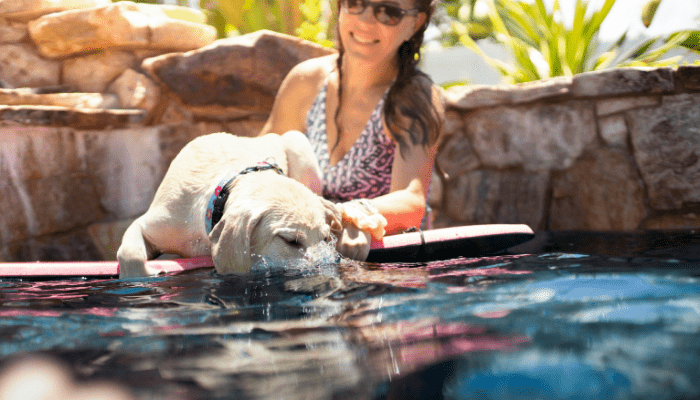
Timeline and Cost Expectations in Portugal
Let’s talk numbers. And calendars.
Timeline:
- Design phase: 2-4 weeks
- Permits (if needed): 4-8 weeks (depending on municipality)
- Construction: 6-12 weeks
- Plant maturity: varies, but things start balancing within 6-12 months
Costs:
- Small pool (40m²): €20,000-€30,000
- Mid-size pool (60m²+): €30,000-€45,000
- Custom large-scale systems: €50,000+
Note: If you’re installing in a sloped terrain or rocky site, add 10–20% buffer. Portugal is beautiful, but it doesn’t always dig easily.
Natural Pool Design Ideas for Portuguese Properties
Want your pool to stand out? Blend in.
Here’s what works well in Portugal:
- Stone edging using local schist or granite
- Native aquatic plants like iris pseudacorus or water mint
- Terraced layouts on hillsides in Douro or Monchique
- Cork decking is sustainable, local, and slip-resistant
- Pergolas and shaded loungers using olive wood or eucalyptus
Pro tip: mimic natural contours. If your land already has a dip or slope, use it. Natural pools love elevation. Bonus, less pumping.
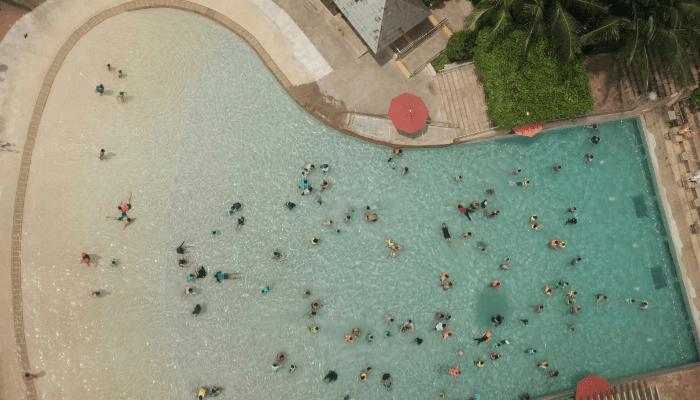
Pros and Cons of Natural Swimming Pools
Let’s call it straight:
Pros
- No chemicals
- Environmentally sustainable
- Visually stunning
- Great for skin, eyes, and Instagram
- Low long-term costs
Cons
- Higher upfront cost
- Requires understanding of living systems
- Can attract wildlife (some welcome, some not)
- Not instant, it matures over time
If you’re someone who wants pristine blue water on day one, a natural pool might challenge your patience. But if you’re playing the long game? It wins. Every time.
Maintenance & Aftercare: What to Expect
No, you don’t just “set it and forget it.” But it’s also not full-time work.
Here’s what’s involved:
- Regularly check pumps and skimmers (weekly)
- Trim plants and remove decaying matter (monthly)
- Keep an eye on water levels during dry months
- Clean sediment from gravel zone as needed (every few months)
- Full inspection every 1-2 years by a pro
Most homeowners either handle the basics themselves or hire someone locally for seasonal upkeep. The key is balance, when the system is healthy, it maintains itself with minimal intervention.

Final Tips on Hiring Locally
This is where the “near me” part of your search pays off.
Hiring locally means:
- Faster site visits
- Better understanding of regional soil and water conditions
- Lower transport costs for materials
- More responsive post-build support
Ask for a walk-through of a local project. Ask if they’ll be the ones actually doing the work, or just subcontracting. And ask how they’ll support you after the last stone is set.
Good builders won’t flinch at these questions. In fact, they’ll be glad you asked.
Conclusion
Building a natural swimming pool in Portugal is one of the smartest upgrades you can make, both for your lifestyle and for your property value.
But this isn’t a Pinterest project. It’s an ecosystem. It needs design, balance, and the right hands to bring it to life.
The good news? There are some incredibly talented natural swimming pool builders in Portugal right now. People who understand how to combine ecology with architecture. People who can look at your terrain and say, “Yes, this will work, and here’s how.”
If you’re still on the fence, ask yourself one question: do you want a swimming pool that just looks good, or one that actually feels good to swim in?
Skip the chlorine. Keep the frogs. Build something worth bragging about.
And if you’re serious about starting, don’t wait for summer. The best builders get booked months in advance. Time to get that quote.
Skip the chlorine. Keep the beauty.
At Oásis Biosistema, we design and build chemical-free natural pools that blend perfectly with Portugal’s land, climate, and lifestyle.
FAQ
What is the cheapest way to build a natural swimming pool?
The cheapest way to build a natural swimming pool is by DIYing a small, unlined pond-style design using local stone, gravel, and aquatic plants. Skip concrete and install a basic solar or low-voltage pump. A compact, self-built natural pool can cost as little as €3,000–€10,000, depending on materials and excavation.
Can you have a swimming pool without chemicals?
Yes, you can have a swimming pool without chemicals by building a natural swimming pool. These eco-friendly pools use plants and biological filtration instead of chlorine to clean the water. No harsh chemicals are needed, making them safer for skin, wildlife, and the environment while maintaining clear, swimmable water naturally.
What is a natural swimming pool called?
A natural swimming pool is also called a swimming pond, biopool, eco pool, or organic pool. In Europe, it may be referred to as a “Naturpool” or “Schwimmteich.” These pools use plants and biological filtration systems instead of chemicals to maintain clean, swimmable water in a natural, sustainable way.
How much does it cost to convert a pool to a natural pool?
Converting a traditional pool to a natural pool typically costs €15,000 to €30,000. The price depends on the pool’s size, existing system, and whether a regeneration zone is added. While not always cheaper than a new build, conversions offer long-term savings by eliminating chemicals and reducing energy consumption.

